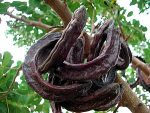 Also called St. John’s-bread and locust bean, this evergreen tree is a member of the pea family (Fabaceae) and native to Southern Europe, Northern Africa, the Levant, Middle East and Macaronesia. It is low-branching, dense, and compact and has contorted branches, rough dark-brown branches and a rounded crown. The pinnately compound leaves are six to nine inches long and have six to ten oval leaflets one to three inches long. They are leathery, glossy, and dark green above with paler undersides. Red buds open to small yellowish male and female flowers carried in lateral racemes on separate trees in spring. Female flowers produce brown, glossy, flat, narrow, leathery pods four to twelve inches long and containing up to 15 seeds. Both male and female flowers must be present for pod production. Photo Credit Wikipedia
Also called St. John’s-bread and locust bean, this evergreen tree is a member of the pea family (Fabaceae) and native to Southern Europe, Northern Africa, the Levant, Middle East and Macaronesia. It is low-branching, dense, and compact and has contorted branches, rough dark-brown branches and a rounded crown. The pinnately compound leaves are six to nine inches long and have six to ten oval leaflets one to three inches long. They are leathery, glossy, and dark green above with paler undersides. Red buds open to small yellowish male and female flowers carried in lateral racemes on separate trees in spring. Female flowers produce brown, glossy, flat, narrow, leathery pods four to twelve inches long and containing up to 15 seeds. Both male and female flowers must be present for pod production. Photo Credit Wikipedia
The pods, sometimes translated as husks, mentioned in the Bible are generally thought to be the seed pods of the carob tree. These pods are protein-rich , contain up to 40 percent sugar and were fed to swine.
Luke 15.16 (NKJV) In the prable of the Prodigal Son, the younger son hired himself out as a keeper of swine after spending all his inheritance foolishly.
“And he [the younger son] would gladly have filled his stomach with the pods that the swine ate, and no one gave him anything.”
The carob tree likes full sun and average, light, moderately moist, well-drained in USDA Hardiness zones 9-11. It tolerates alkali soil, some drought, heat, and dry atmosphere as well as urban pollutants. Propagation is difficult but may be accomplished by seed or grafting. Plants are generally healthy and have no signficant pests or diseases. Carob tree is cultivated as an ornamental for shade or as a street tree as well as for its pods that can be ground and used in place of cocoa powder. Although slow growing, trees live for a very long time.
The genus name, Ceratonia, is from the Greek word keras meaning horn and referring to the shape ofseed pods of the carob. The specific epithet, siliqua is the Latin word meaning pod or husk and refers to the fruit of the tree.
.